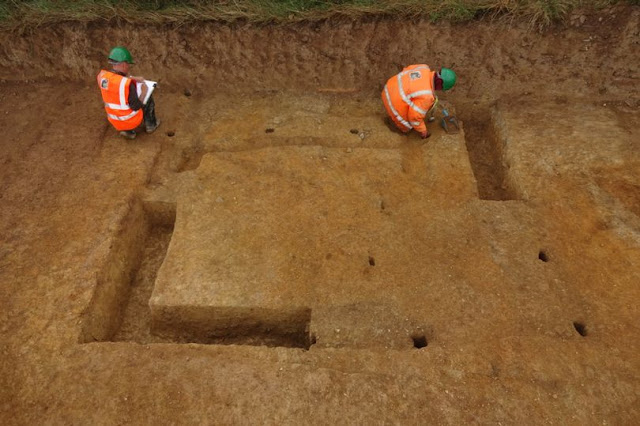Local archaeologists working with Redrow Homes believe they have discovered the most south-westerly Roman town in Britain at the housebuilder’s Romansfield development in Okehampton, Devon.
 |
| Archaeologists have uncovered the remains of a Roman town on a building site in Devon where new homes are being built [Credit: AC Archaeology] |
Locally based independent commercial archaeological consultancy AC archaeology has found the foundation trenches and post-holes of some 25 timber-constructed buildings situated either side of a well-preserved Roman road extending eastwards from a military fort.
The fort, which is located immediately west of Romansfield, is protected as an historic site included in the Schedule of Monuments kept by the Secretary of State for Digital, Culture, Media and Sport.
The buildings found at Romansfield are believed to be contemporary with the fort and represent a ‘vicus’, a small town or village established by the military and inhabited by the local population to service the needs of the troops posted at the fort. This is the first time that such a settlement has been excavated in Devon.
 |
| Imported Roman pottery found at the site [Credit: AC Archaeology] |
Reuben Cooke, head of technical at Redrow West Country, commented: “It’s been fantastic to be involved in the archaeological investigation and excavation of artefacts which date back thousands of years.
“It’s wonderful to think that 2,000 years ago people were making Romansfield their home, and now Redrow is creating history and providing homes for people here once again.”
Bill Horner, Devon County archaeologist working with West Devon District Council to advise on the scheme, said: “The excavation at Okehampton gives us a rare insight into the process of conquest and into the military and associated civilian community that made Britain part of the Roman Empire.”
Christopher Caine, AC archaeology team lead, said: “As an archaeologist, this is a unique and exciting opportunity to be involved in the first excavation of a Roman vicus in the county and is one of the most important excavations I have worked on in my 15 years in the profession.”
The archaeological works at the Romansfield development are still ongoing, so further discoveries could still be made. Once the excavation has been completed there are plans to preserve the Roman road running through the site with an open linear corridor.
A section of Roman road will also be reconstructed and an interpretation panel placed adjacent to it. Interpretation panels will also be constructed at the new school currently being built on the site.
 |
| The ancient town is thought to be the most south-westerly settlement ever found in England [Credit: AC Archaeology] |
The archaeologists will then have the task of carrying out research on the archaeological records generated as part of the excavation; specialists will carry out analysis on the various artefacts found and ultimately a detailed report will be prepared on the overall findings.
In due course, the finds and archive will be donated by Redrow Homes to Plymouth City Museum and Art Gallery. A temporary display at the Museum of Dartmoor Life in Okehampton is also being considered.
Reuben said: “We’ve been working closely with the AC archaeology team and Devon County archaeologist Bill Horner to ensure all artefacts found at Romansfield have been safely registered and stored. We’re looking forward to seeing the section of Roman road that is going to be reconstructed.”
Source: The Exeter Daily [November 06, 2018]






Комментариев нет:
Отправить комментарий